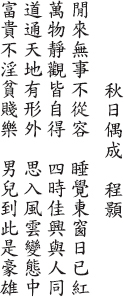204

Ch’eng Hao (1032–1085) taught thousands of students at his home in Loyang and served briefly in the nearby capital of Kaifeng. But due to his opposition to the policies of Wang An-shih, he was banished to South China and died before he could return. Still, with his younger brother, Ch’eng Yi, he was among the leading lights of neo-Confucianism. This poem reflects his philosophy whereby all things are seen as part of the Tao and also as part of the mind. Thus, man shares the same nature as Heaven and Earth and all creation. The harmony of this nature is easily upset by desire and ignorance, but it can be restored through the cultivation of such virtues as kindness and equanimity. The last two lines paraphrase Mencius: 3b/2.3.
Occasional Poem on an Autumn Day
CH’ENG HAO
When I’m at peace I let everything go
I wake by the east window long after sunrise
viewed without passion everything is fine
seasonal glories hold true for man
the Tao fills the world the formed and the formless
our thoughts are in the ever-changing wind and clouds
not troubled by wealth content in poverty
the person who reaches this is truly noble